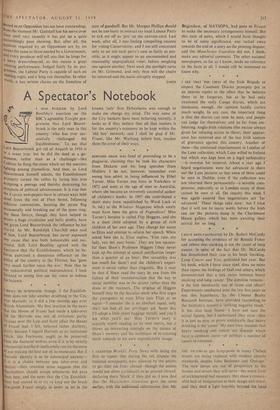BERNARD SHAW was fond of pretending to be a plagiarist,
claiming that he took his characters from Dickens and his long speeches from Moliere. I do not, however, remember ever seeing him admit to being influenced by Ethel Turner. Miss Turner was born in Yorkshire in 1872 and went at the age of nine to Australia, where she became an extremely successful author of children's books. In 1897 she contributed a short story (now' republished by Ward Lock at 3s. 6d.) to the Windsor Magazine which surely must have been the germ of Pygmalion? Miss. Turner's heroine is called Flip Huggins. and she is a slum child adopted by a group of rich children of her own age. They change her name to Eliza and attempt to reform her speech. When asked how she is, Eliza replies, `Fust rate, my lady. you bet your boots.' They are less success- ful than Shaw's Professor Higgins ('they never kept up the attempt at speech purification longer than a quarter of an hour. Her versatility was too much for them') and the children's experi- ment is social rather than linguistic. But it may be that if Shaw read the story he saw from the failure of their transformation that the key to social mobility was in the accent rather than the dress or the manners. The original of Higgins himself may be the Socialist uncle who first urges the youngsters to treat Eliza (née Flip) as an equal-1 consider she is an absolute equal, only she's not had all her priyileges yet. Some day I'll adopt a little street baggage myself, and you'll see what you'll see.' Miss Turner's story is scarcely worth reading on its own merits, but it shows an interesting sidelight on the nature of Shaw's memory and his technique of re-creating stock subjects in his own unpredictable image.


































 Previous page
Previous page